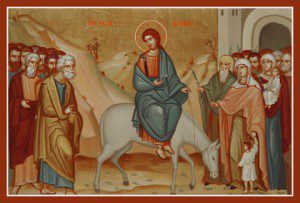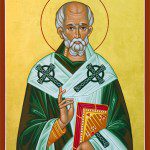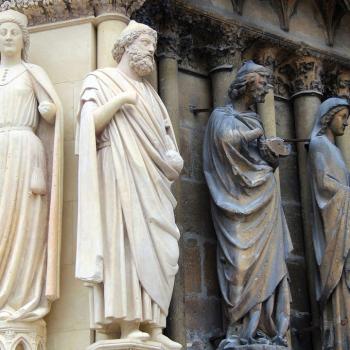 Lectionary Reflections for Palm Sunday, March 24, 2013
Lectionary Reflections for Palm Sunday, March 24, 2013
The Triumphant Entry
Luke 19:28-40; Psalm 118:1-2, 19-29
The Passion of Jesus
Isaiah 53:4-9a; Psalm 31:9-16; Philippians 2:5-11; Luke 23:1-49
The order of the day for the first day of Holy Week, Palm Sunday, is the interplay of celebration and passion. It is the appropriate theological as well as chronological entry point for the spiritual maelstrom on the horizon for us and for Jesus. Holy Week encompasses the full spectrum of public and private life – adulation and abandonment, celebration and conflict, integrity and suffering. During Holy Week, we encounter the ambiguity of religious and secular institutions. Intended for good, they are often – as is the case during Holy Week – diabolical agents of destruction. As Walter Wink observed, the powers are good; the powers are fallen; the powers can be redeemed.
The gospels present Jesus’ ministry as cruciform in nature. Jesus is lured toward Jerusalem and the cross. Some see this as predetermined. Jesus’ whole life is aimed at redeeming us on Calvary. Jesus, Pilate, the Jewish religious leaders, and the crowd are playing preordained roles in God’s plan of salvation, they assert. In contrast, I see the cross as a reflection of the providence of grace, not the providence of predestination. Jesus’ integrity, shaped by his faithfulness to God’s vision, made the cross a possibility. He could have chosen other routes, but his integrity led him to follow God’s vision by staying in Jerusalem rather than choosing the peaceable life of a married village rabbi, making a local difference but never of any consequence in the unfolding of human history. Jesus followed God’s vision through the valley of conflict and persecution. Jesus’ first century – and Holy Week – faithfulness God’s vision to God’s vision of Shalom, and not destruction, shapes our lives today.
After the celebration of the Jesus’ entry to Jerusalem, we turn to the abandonment and agony of Jesus’ passion. Isaiah portrays a faithful rabbi, who faces persecution and conflict with integrity and fidelity. The suffering servant of Isaiah stays the course regardless of the opposition he faces. His integrity is sustained as well as nurtured by his trust in God’s faithfulness.
Psalm 31 also highlights God’s faithfulness. Despite the conflicts of life, the Psalmist proclaims that our times our in God’s hands. God sustains us as we travel through the valley of the shadow of death and God will meet us on the other side.
Philippians 2 presents one of the earliest Christological hymns. Whether initially from Paul’s hand or from another early Christian author, this passage implicitly contrasts Christ and Caesar. Both are rulers, but one rules by coercion, while the other rules by love. Caesar is exalted above us; Christ is one of us. Bowing before Caesar is motivated by fear; bowing before Christ is motivated by love. Surely, Paul’s Philippian readers would have known which path to follow to be faithful to the way of Jesus and God’s vision for their community.
There is an implicit universalism in Philippians 2. Every knee bows from love – the key word is “every.” Could this mean that eventually everyone will experience God’s love first hand? Could this mean that despite our infidelity eventually we will experience grace, inspiring us to say “yes” to God’s love? Surely this is the implication of Philippians 2 and Jesus’ pronouncement on the cross, “Father, forgive them.” Jesus’ amazing forgiveness opens the door for every lost child, regardless of her or his past infidelities.
The characters in Luke’s passion are flesh and blood decision-makers. They are agents in condemning Jesus, not characters in a previously written script. Jesus is also an agent: at every step of the way, he is making decisions, feeling the pain of abandonment, and experiencing the emotional, spiritual, and physical agony of torture.
To make sense to twenty-first century people, Palm/Passion Sunday must be seen as a contemporary event. The hymn, “Were you there when they crucified my Lord?” refers to our current situation. We are both faithful and fickle. We are committed, yet turn our back on our ideals and God’s dream for humankind and the Earth. We feel courage, yet are overcome by fear. Still, there is hope in our ambivalence and weakness; God does not abandon us even when we abandon God. God persistently and providentially provides pathways toward wholeness, and like a holistic physician uses every means to bring us to wholeness, regardless of our past. We were there at the Cross and Palm Sunday; and we are here on Easter, living the resurrection and transformation God envisions for us. Through it all, we can proclaim with Psalm 118, “this is the day that God has made and we will rejoice and be glad in it.”















